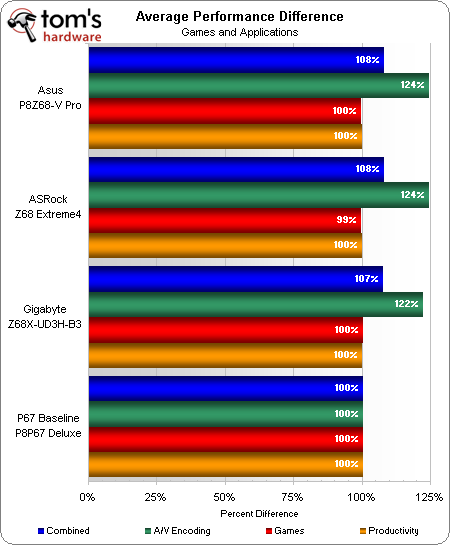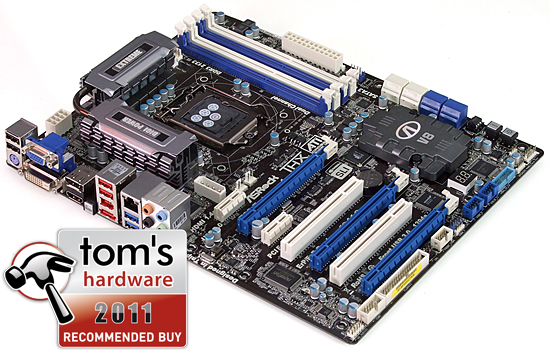Z68 Express Roundup: Three Motherboards Do Battle Around $200
Intel reserved its most feature-rich LGA 1155 platform for (or four?) months past the launch of its Sandy Bridge-based processors, but was it worth the wait? We compare three upper-mainstream Z68 examples to a top-quality P67 predecessor to find out.
Conclusion
Let’s take a look at the overall performance difference between Z68 motherboards, with a P67 platform thrown in for good measure. We averaged the results of each chart (rather than each application), so that both Intel GPU-optimized transcoding benchmarks count for only ¼ of our A/V encoding results.

Even though Intel’s integrated GPU benefits only 25% of our encoding applications, it adds 24% to those performance numbers. And, even though encoding applications count towards only 25% of our combined performance calculation, its overall benefit is around 8%. Thus, anyone who really wants to shrink video for their portable devices will really want to get a Z68, rather than a P67 board.
So who wins? The P8Z68-V Pro has the best overall performance, but the difference between it and the Z68 Extreme4 is less than 1%. The average difference is too small to show up on the chart, and ASRock had better efficiency.
The P8Z68-V Pro has a higher CPU overclock, but we feel a little distressed that a four-module DDR3-2200 memory kit made it beg for mercy. Not that any realistic person would really need memory that fast, but this is just another point in our overall discussion.
The real reason why we can’t hand the win to the P8Z68-V Pro is its compromised expansion card slots. Using the bottom slot at x4 results in two x1 slots and two onboard controllers being disabled. In other words, the bottom graphics card slot turns out to be more gimmick than feature, and may cause system builders to feel like they’ve been duped. That type of tomfoolery might be acceptable in lower-priced segments, but this is a $210 board!
For $10 less, ASRock adds a PCIe bridge to its Z68 Extreme4. Anyone who really wants a x4 slot should view this as mandatory. So, ASRock wins our Recommended Buy award.

This was originally supposed to be a $150-200 motherboard roundup. Asus failing to hit the price point after the rest of the article was written forced us to change that plan. Gigabyte's also makes a $210 model that competes directly with the P8Z68-V Pro, so its (estimated) $160 Z68X-UD3H doesn't officially compete for the same group of customers.
Stay On the Cutting Edge: Get the Tom's Hardware Newsletter
Get Tom's Hardware's best news and in-depth reviews, straight to your inbox.
Not that there's any serious lack of features on the Gigabyte board at its lower price point. By leaving out a third graphics card slot, Gigabyte avoids both Asus' tricks and ASRock's added component expense. Instead, its only shortcoming comes from overclocking. That gives the Z68X-UD3H an incredible amount of value to non-overclockers who don't need a x4 slot, even though it gets upstaged by ASRock in our final analysis.
-
Crashman user 18ASrock comes with 4 eSATA cables?KisakukuThe first UEFI screenshots for ASRock and Asus are switched.Fixed, thanks!Reply -
evga_fan ->ThomasReply
"Gigabyte’s Quick Boost application sets our processor at 200, 400, or 700 MHz beyond its rated frequency."
Just so you know. Anyways, keep up the good work!
Cheers -
crisan_tiberiu so, basicaly there is no difference in performance between theese boards as i can see.Reply -
hmm .. was thinking of getting an Asus P8Z68-V Pro .. not so sure now knowing that the other boards offer the same performance and are both cheaper.Reply
-
Olle P One additional feature of the ASRock card that isn't mentioned is its set of holes matching a socket 775 cooler. That feature was the main reason I ordered one of these cards three days ago, since I won't have to spend money on a new CPU cooler.Reply -
crisan_tiberiu Olle POne additional feature of the ASRock card that isn't mentioned is its set of holes matching a socket 775 cooler. That feature was the main reason I ordered one of these cards three days ago, since I won't have to spend money on a new CPU cooler.Reply
ermm thats pro, since i have a socket 775 core 2 duo atm. Any other motherboards out there that suport this?? i would love to know
